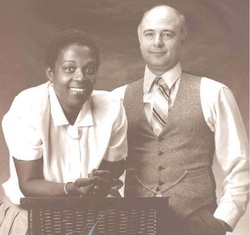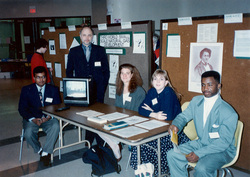The Future of AHEAD
In June 2012, AHEAD Energy returned to Rochester, New York and is working under new leadership (see below for the history of AHEAD). We are increasing focus on technology development; specifically the combination of renewable energy and green utilization of coal and natural gas. Three-quarters of a billion people are without energy in Africa, and it could be decades til the central power grid catches up with the demand. We work to bridge the gap between micro power projects and the central power grids in needy areas. Wind, solar and hydro-power are supplemented with engine generators, fuel cells, and microturbines, all operating on green, locally produced fuels. All modern development requires energy, and AHEAD explores the most economically and environmentally efficient means to provide that energy in under-served communities.
Learn More: Watch our video "Energy for All"
Narrated by Ben Ebenhack
The History of AHEAD

In the 1980's, horrific images of starvation in Ethiopia infiltrated TV screens and the world's consciousness. Though the flood of media coverage was new, the problems were not: struggles with modern development have existed in Africa for decades.
When petroleum engineer Ben Ebenhack read stories of food aid rotting on the docks due to lack of transportation, he started to think: one of the most fundamental issues was a fairly simple one. Africa needed more access to modern energy. Through his work in assessing energy supplies worldwide, Ben knew that energy resources existed throughout the developing world – and also why they were being overlooked by national and multinational energy companies. Ben was convinced that energy could be produced using local resources for the benefit of local people,
Dr. Karen E. Fields, the Founding Director of Frederick Douglass Institute for African and African American Studies,was interested in movement in similar directions. In 1987, she invited Ben to work with the Institute’s social scientists to evaluate the potential for localized energy projects.
With the help of the University of Rochester, the AHEAD Energy Corporation was chartered in 1988 as a public charity.
When petroleum engineer Ben Ebenhack read stories of food aid rotting on the docks due to lack of transportation, he started to think: one of the most fundamental issues was a fairly simple one. Africa needed more access to modern energy. Through his work in assessing energy supplies worldwide, Ben knew that energy resources existed throughout the developing world – and also why they were being overlooked by national and multinational energy companies. Ben was convinced that energy could be produced using local resources for the benefit of local people,
Dr. Karen E. Fields, the Founding Director of Frederick Douglass Institute for African and African American Studies,was interested in movement in similar directions. In 1987, she invited Ben to work with the Institute’s social scientists to evaluate the potential for localized energy projects.
With the help of the University of Rochester, the AHEAD Energy Corporation was chartered in 1988 as a public charity.
Evolution

AHEAD’s approach to developing energy services in Africa evolved over time as information was gathered about economic realities, cultural preferences, and environmental constraints surrounding the pressing need for Africans to access alternatives to firewood. University of Rochester students who enrolled in Institute classes and served as AHEAD interns played an important role in this progression.
Our initial focus, developing Africa's natural gas resources, has evolved into optimizing "energy mixes", i.e. hybridizing multiple technologies to meet a variety of energy needs. When possible, installed systems have the capacity to transition toward future technologies with increasingly smaller negative impacts on the environment. Thus, AHEAD began collecting information on a broad range of energy resources, technologies, distribution systems and business approaches. Of particular concern was the development of appropriately scaled projects – large enough to bring about systemic change but small enough for locals to operate.
Our initial focus, developing Africa's natural gas resources, has evolved into optimizing "energy mixes", i.e. hybridizing multiple technologies to meet a variety of energy needs. When possible, installed systems have the capacity to transition toward future technologies with increasingly smaller negative impacts on the environment. Thus, AHEAD began collecting information on a broad range of energy resources, technologies, distribution systems and business approaches. Of particular concern was the development of appropriately scaled projects – large enough to bring about systemic change but small enough for locals to operate.
First Project
A grant received from the proceeds of the 1985 Live Aid concert enabled Ben Ebenhack and Karen Fields to make a trip to Mozambique in 1991. There, they discovered an effort to provide electricity to the town of Vilankulos, population 60,000, that was stalled by project developers' inability to afford the installation of standard gas transmission infrastructure. Natural gas from a proven field needed to be transported 100 kilometers and linked to an existing electric grid. AHEAD provided information on an alternative gas pipeline technology which was adopted and resulted in the project’s completion. Not only was the Town of Vilankulos electrified, but services were subsequently extended to neighboring towns and even to an offshore island.
Our Solution
Green development of coal and natural gas resources with sequestration to provide self-sufficient energy infrastructure for transportation, agriculture, and electricity generation.
Facilitating local production and distribution of bio- and synthetic fuels (as an alternative to wood); powering small generation systems to supplement renewables and meet peak demands.
Design and deployment of hybrid energy systems for off-grid areas; using a cost-effective mix of renewables and small generation systems.
Where we work:
Sub-Saharan Africa; current focus on Uganda, Kenya, Mozambique, and Ghana.
AHEAD helps schools and hospitals to install and operate grid-independent green energy systems. This becomes a model to be widely deployed in remote and under-served areas, leading to improved quality of life and economic development.
Green development of coal and natural gas resources with sequestration to provide self-sufficient energy infrastructure for transportation, agriculture, and electricity generation.
Facilitating local production and distribution of bio- and synthetic fuels (as an alternative to wood); powering small generation systems to supplement renewables and meet peak demands.
Design and deployment of hybrid energy systems for off-grid areas; using a cost-effective mix of renewables and small generation systems.
Where we work:
Sub-Saharan Africa; current focus on Uganda, Kenya, Mozambique, and Ghana.
AHEAD helps schools and hospitals to install and operate grid-independent green energy systems. This becomes a model to be widely deployed in remote and under-served areas, leading to improved quality of life and economic development.